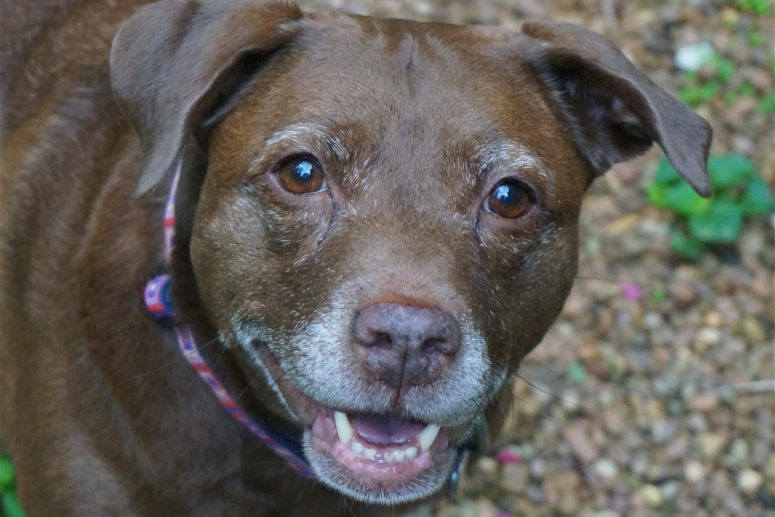
If it was up to us, our four-legged friends would stay young forever. Even though that’s not the case, dogs maintain their loyal and lovable nature no matter how old they are! How can you maintain their health and happiness as they age? Here are the the common changes and ailments senior dogs face that you should pay attention to and address if necessary.
Skin and coat changes: Dogs often start to show gray hair as they get older, often around their muzzle and eyes. Their fur can also change in thickness and texture, but dull coats may be helped with certain supplements. As for skin, it can also become thinner with age, and therefore becomes susceptible to injury. Look out for wounds that don’t heal (could be an immune system deficiency) or for bumps on your dog’s skin. These are often benign tumors that don’t require removal unless they are prone to trauma, but any lump should be checked by a vet.
It’s also common for a older dogs, especially large breeds, to develop calluses on their elbows from spending more time laying down. You should also keep an eye on the foot pads (which can become worn with age) and nails (which may need trimmed more frequently) of your aging pet.
Weight and nutritional need changes: Just like humans, dogs’ metabolism changes as they get older. They require fewer calories due to decreased energy requirement and decreased activity, but they have other dietary requirement, like more fiber and less fat intake. Obesity is a very common issue for senior dogs which can lead to additional health problems. Your vet can help you determine the proper diet for your dog at all stages of life, especially the later years.
Arthritis and mobility issues: Arthritis is a common occurrence in larger breeds, breeds prone to Intervertebral Disc Disease (like Dachshunds and Basset Hounds), and dogs with past joint injuries. Arthritis severity ranges from stiffness to complete debilitation. It often causes hind leg weakness and trouble navigating stairs and rough terrain. Fortunately there are medications to ease the pain of arthritis.
Inactivity in senior dogs leads to loss of muscle mass, which in turn makes activity more difficult. Avoid this cycle by exercising your pet to maintain tone. Ask your vet for exercise recommendations that conform to your dog’s abilities.
Vision and hearing loss: Hearing loss affects some dogs, and you may not notice it until your dog stops obeying commands or is startled by your approach because he couldn’t hear you. Teaching hand signals at a young age can be beneficial should issues develop, and there are lots of other signals you can establish with your dog to compensate for hearing impairment.
A condition called Nuclear Sclerosis is common for senior dogs, and while it makes eyes look cloudy, it doesn’t affect vision. Cataracts and glaucoma, which are often seen in certain breeds, do affect vision. Your dog’s routine physical exam should include and eye exam as well.
A dog with either vision or hearing loss may need special attention to help avoid potential dangers.
Changing immunity and organ function: Older dogs are more prone to infectious diseases because their immune systems do not function as well as when they are young. These diseases are also usually more severe. Keeping up with vaccinations into your dog’s senior years can help protect him from illness.
The heart decreases in efficiency as a dog ages, which can impact the function of other vital organs. Your vet can run diagnostic tests to determine if your dog has heart disease, and may prescribe medications to help control it.
The lungs of senior dogs lose elasticity, which decreases lung capacity. This can lead to respiratory infections or cause your dog to tire more easily.
Dental Care: Dental disease is highly prevalent in dogs, with many as young as three showing signs of gum disease. Bad breath could be a sign of an underlying oral problem. Regular tooth brushing, cleanings, and dental examinations are important for keeping breath fresh and preventing disease. Don’t fret if your senior dog needs to have a tooth pulled – dogs who loose teeth can still live and eat happily!
Changing behavior and activity level: There are many reasons an aging dog may act differently, some more severe than others. For example, nervous system issues can lead to cognitive dysfunction, which may present as confusion, restlessness, or inactivity. Dogs can also develop dementia when they are older.
More commonly, many senior dogs do not handle stress well. they may develop more aggression or separation anxiety. Certain medications can help with such problems.
Your dog acting differently could simply indicate he’s not feeling well. An underlying issue may be causing discomfort or pain. Keep an eye on your dog’s activity or behavior and report anything that seems out of the ordinary to your veterinarian so that anything serious can be appropriately addressed.
As dogs age, they go through many completely natural changes. However, they are also increasingly prone to more serious health complications. That’s why many vets recommend routine exams every 6 months once they reach a certain age. The best things you can do for your older pets is monitor health and behavior changes, take them in for those regular vet visits, and of course show them lots of love!
